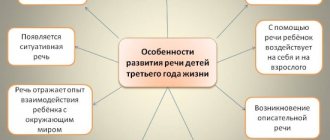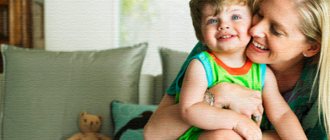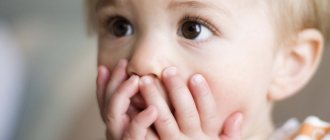What is ZPRR
Delayed mental speech development of a child is a disease in which he lags behind age norms in his psycho-emotional development. Characterized by speech dysfunction, behavioral disorders, emotional disorders - rigidity or lability. Some children also experience motor dysfunction.
Develops against the background of diseases of the brain or central nervous system. On the one hand, a special neurological status can cause a delay in the development of the psyche and speech, on the other hand, the pathology itself negatively affects mental development.
Causes of delayed mental speech development of a child
There are many factors that can trigger the disease. They can be divided into groups:
- Intrauterine development. Hypoxia, fetal infections. Its development after birth is influenced by illnesses and injuries that the mother suffered during pregnancy.
- Complicated childbirth. Traumatic, premature or rapid birth, entanglement.
- Diseases in the first year of life. Neuroinfections, brain injuries.
- Genetic factors. Chromosomal abnormalities and heredity - the disease tends to worsen in the next generation.
Delayed mental speech development of a child may occur against the background of diseases that disrupt the functioning of the brain. These include: congenital diseases of the central nervous system, epilepsy, hydrocephalus, cerebral palsy, brain tumors, disorders of the outflow of cerebrospinal fluid.
As a rule, parents learn about the situations listed above - congenital disorders, primary diseases and injuries - immediately and provide assistance to their child - they undergo treatment and rehabilitation courses.
But there are situations when a child is born physically and mentally healthy, grows and develops in accordance with age norms. And then suddenly he is diagnosed with SPD. Social factors can contribute to this : overprotection or, conversely, cruelty, violence or indifference towards the child, severe psychological trauma, unfavorable psychological climate in the family.
The child understands everything, but does not speak. What is the reason?
Hello. My daughter is 3.5 years old and we don’t have a dialogue. For example, if I ask her: Do you want to eat? She will run to the kitchen. Neither “yes” nor “no”. Or if you ask: What did you do today/ate/what did you play/what are you doing/what are you drawing, etc. -she won't answer. At the same time, he seems to understand everything. She knows all the colors, even the most complex ones, and learned them before she was 2 years old; she knows all the letters of the alphabet, counts to 20, shapes, etc. , fulfills all requests: bring, show, find, draw, etc. But there is no dialogue. She can’t tell where she was, what she saw. You ask a question, she says some nonsense that is off topic (what she thinks in her head is what she says) or is silent. She pronounces everything, her speech is quite clear - all the words are understandable. Answers only the questions “what is this?”, “who is this?” “What color?”, at the request, shows parts of the body and names them, shows what is where in the picture. But there is no conscious speech. He reacts to prohibitions by shouting, he understands “no”, sometimes he obeys, sometimes he protests. For example, if you offer her something that she doesn’t want, she will either push her away or let out a dissatisfied cry and it becomes clear that she doesn’t like it. Sometimes you have to guess, go through everything until you understand what she needs. She has a good memory - she remembers songs , texts from fairy tales (I read to her a lot), poems, phrases from cartoons. She speaks a lot in phrases from cartoons - this is very disturbing! She inserts these phrases everywhere, both on-topic and off-topic, although she doesn’t watch cartoons often. But whatever she’s stuck on, she’ll talk a lot, go through all the phrases and phrases she knows—both from cartoons, and which I tell her, and from poems and from books . He speaks in memorized phrases. When he sees a cat: “Kitty has come,” “Kitty, scatter.” In the evenings, the same phrase: “Daddy will come and bring something tasty,” etc. Such phrases that he will hear and repeat in appropriate situations. And not the right ones either. What he remembers at a given second from familiar phrases, that’s what he will say. Sometimes I sing to her a song that she knows well and I mix up the words, she immediately gets capricious, like she sang it wrong. You ask: what’s the right way? He won't say. I’ve read about autism with simple phrases from cartoons and I’m worried. He loves outdoor games, loves to play together, sometimes asks: Get the ball, draw a bear, give me juice. Understands adjectives: soft, fluffy, hot, cold, beautiful, cute, etc. She says when she's in pain. Fulfills requests. There is a pointing gesture, he looks into the eyes, he loves hugs, he loves some kind of contact games, he asks to be held, he loves to sit on laps, he hugs, he loves to kiss. If he coughs, he says it’s a cough; if I cry, he says “mom is crying.” The passive vocabulary is very large. Only familiar words, phrases and phrases are active. She doesn’t really make contact with other people’s children, she will stand next to her, watch, play nearby. The family is very contactable - with me, with my dad, with my brother... that is, she seeks contact, asks to play, draw, loves all kinds of tickles. Cheerful, active. She’s not afraid of strangers, but she doesn’t try to make contact with them either. She just watches with interest, she can come up and join the game, but she still plays as if she were on her own, just nearby. What worries me is the lack of dialogue, conscious speech and these memorized phrases. The stock of these phrases is replenished, but they are somehow meaningless. He just knows them and says them.
Who should I contact? Could this be a variant of the norm at our age (3.5 years), who should I contact first? How to act correctly yourself?
Thanks a lot.
Symptoms of mental retardation of speech
A young patient will not be officially diagnosed until 4 or even 5 years old. But the first prerequisites can be noticed even in the first months of a newborn’s life. If a violation is suspected, the pediatrician will definitely ask the parents leading questions - and based on the information received, he can already assume a delay in the mental development of speech.
Here are the signs by which you can suspect him.
- At 4 months, the baby does not smile, ignores the parents’ verbal address to him, their gestures and facial expressions;
- At 8 months the baby does not try to repeat words using sounds, and at 12 months he is verbally passive;
- At 1.5 years old, he does not understand the meaning of simple words, does not respond to his name, does not formulate requests at a primitive level (“give”), does not chew;
- At 2 years old he knows very few words and does not learn new ones, and later his vocabulary contains no more than 20 words, there is no simple phrasal speech;
- A three-year-old child does not speak in sentences, “swallows” endings, speaks slowly, draws out sounds, does not conduct a dialogue - instead of answering, he repeats the question asked.
Parents should pay attention to other signs that accompany the disorder. So, if a child is hyperactive, aggressive, inattentive, has difficulty remembering new things, has a poor imagination and emotions, is uncommunicative, and physically weak - all this should alert parents and become a reason to contact a pediatrician.
Year one
The first months of a child’s life are a time for emotional communication. The baby only listens to the sounds surrounding him from all sides and reacts to them with the help of facial expressions. Despite the fact that the baby does not understand speech yet, it is necessary to communicate with him. This not only evokes positive emotions in him, but also teaches him to listen, creates a desire to “speak” himself.
In the second or third month, emotions begin to translate into sounds. Seeing the mother, the baby not only perks up and expresses his joy with a smile and gestures, but also begins to “speak” in his own language - the humming stage begins. The “vocabulary” at this time is small and poorly understood: sounds and sound combinations like “e”, “khi”, “aaa”, “ha”, “gee”, etc. are in use. By the end of the 3rd - beginning of the 4th month, the humming intensifies - the baby begins to need to communicate. And by the end of the sixth month, the baby is already pronouncing individual syllables: pa, ma, ba, ga, etc. Repeated several times in a row, they form “words”: “mom,” “baba,” “dad.” Of course, this is not yet a full-fledged speech, but at the same time it is an important preparatory stage for its assimilation.
From 6 months, the baby not only pronounces sounds and syllables (babble), but also learns to repeat. The ability to establish a connection between a word and an object is formed. At 9-10 months the first words appear.
A particularly strong need to “talk” is caused by toys that the baby can call with onomatopoeic words: “Lala” (doll), “bi-bi” (car).
By 12 months, a child’s vocabulary contains an average of 10-12 words —easy to pronounce or onomatopoeic, but these are already full-fledged words—a means of communication.
Methods for diagnosing pathology
Diagnosis is approached in a comprehensive manner. This means that a small patient is examined by different specialists - a pediatrician, an otolaryngologist, a neurologist, a speech therapist. In addition to collecting an anamnesis, examining and assessing the child’s health, he is sent for hardware diagnostics. This is necessary because, against the background of ZPRD, organic matter changes, in particular, the work of the left hemisphere of the brain, which is responsible for the development of speech, is disrupted. Therefore, the final diagnosis is made based on the results of examinations - EEG, computed tomography, evoked potentials technique.
After diagnosis, comprehensive treatment begins. A neurologist, psychologist, speech therapist, and reflexologist take part in it. Parents play a huge role - without them it is impossible to achieve success.
What is general speech underdevelopment (GSD) in children?
General speech underdevelopment (GSD) is a violation of the development of speech skills in a child. Most often, it can be detected at the age of three, when the child begins to actively talk. But OHP is not a symptom of a serious illness, but most often simply insufficient attention of parents to the child’s speech. For example, if a child says “yba”, “suba”, “dau”, and the parents do not correct him, thinking that “it will go away on its own”.
⠀
Four months ago, one of the social networks of the Kidskey online school received the following message:
⠀
“My son is 4 years old. He has been going to kindergarten since he was 3 years old, but he hardly speaks. His speech is similar to the babble of a one-year-old child. I understand it only when it is explained by gestures. My friends reassure me that boys start talking later, but I am very worried because in the kindergarten the children do not want to play with my son, he constantly cries, gets angry and even offends his classmates.
⠀
I do not know what to do. Please tell me, should I do something now or should I wait until the child outgrows it? Is it necessary to go to a specialist or can you practice speech development at home?”
⠀
It is difficult to give some abstract advice without talking to the child. That's why we invited the mother and boy for a free online consultation.
⠀
Wonderful and smiling Roma had no problems with hearing or intelligence, but he communicated with our methodologist like this:
⠀
- instead of “give” he said “yes-yes”, instead of “there is” he said “us-us”;
- instead of a whole word, he named only the root and used it to designate several words at once - “ma” - “machine”, “ba” - “drum”, “banana”, “battery”;
- he spoke the same words in different ways: “machine” - “asha”, “bibi”, “pipi”, “si”;
- I shortened complex words and phrases: “mom went to work” - “ma sya a atu.”
⠀
After the consultation, it became clear that Roma has general speech underdevelopment (GSD) of the first degree.
Speech therapists can make this diagnosis to a child if he said his first words only after 3 years or if he explains himself more with gestures. For example, instead of saying “Mom, give me some candy,” he says “give me,” and then points his finger at the cabinet where the sweets are.
⠀
Below is a table with the norms for child speech development by age . Take a look, but don’t get too hung up on this data - each child is individual and develops at his own speed.
Comprehensive treatment of the disease
The longer the baby does not speak, the longer his mental development “slows down.” Therefore, it is necessary to begin treatment for delayed mental development of speech as early as possible. Various methods are used.
Microcurrent treatment
The reflexologist applies an ultra-low current to the bioactive points of the brain that are associated with speech. This helps restore damaged areas of the central nervous system. You can start reflexology as early as six months old babies. As a rule, a course of 10–12 sessions is prescribed, and after 2.5 months it is repeated.
Transcranial micropolarization
The physiotherapy procedure consists of a targeted effect on certain areas of the brain. As a result, new neural connections are formed in it. The area of the cerebral cortex that needs to be stimulated depends on the problem. The procedure is safe, does not cause adverse reactions and is effective.
Bioacoustic correction for ZPRD
The essence of the method is for the little patient to listen to the electrical signals of his own brain. They are converted through equipment into music - acoustic waves. As a result of such listening, impaired brain functions are restored. The BAC technique combines the latest technologies of music therapy, biofeedback and neurotherapy.
Speech therapy correction of mental retardation
Classes of a speech therapist-defectologist are aimed at developing not only speech, but also thinking, motor skills, and memory. Little patients learn to pronounce sounds correctly, form words, sentences, and speak in phrases. You can study from the age of 2, although in practice speech therapists take children from at least 4 years old. But in the case of delayed mental development of speech, correction should begin as early as possible. At 4 years old, quite a lot of time will have been lost and not all functions will be restored. Therefore, you need to either make an appointment with a speech pathologist-speech pathologist earlier, or begin correctional work with other specialists in their profile.
Speech therapy massage is also useful - it strengthens and stimulates the chewing and facial muscles. As a result, it becomes easier for the baby to pronounce sounds and syllables.
Drug therapy for PVRD
Medicines are prescribed by a pediatric neurologist after hardware diagnostics. Therapy is selected depending on the pathology. As a rule, these are nootropic drugs - Cortexin, Actovegin, Encephabol and their analogues.
Alternative correction methods
Additional methods can be connected:
- Consultations with a child psychologist. They are effective if a delay in the child’s mental speech development occurs against the background of an unfavorable climate in the family, psychological trauma, or errors in upbringing. Play, music, and art therapy work well with young patients;
- Osteopathy. By manually influencing certain areas, the doctor balances the functioning of the nervous system and psyche, and activates the speech centers of the brain. This is an effective direction; experienced osteopaths literally work wonders;
- Dolphin therapy. The method is more common in Europe and the USA. It relaxes the nervous system, but has proven itself, for example, as part of the treatment of autism (and they also lag behind in mental and speech development).
As part of the main treatment, the listed auxiliary techniques give very good results. Discuss with your doctor (pediatrician or neurologist) whether it is worth connecting them in your case.
Preschool age
Three-year-olds are already able to express the simplest judgments, generalize, establish the simplest relationships and distinguish between similar objects.
Vocabulary by the age of 4 is about 2000 words . The child increasingly uses pronouns, adjectives, adverbs in speech, and numerals appear. Sentences are constructed according to the laws of grammar, and he gives detailed answers to questions. Speech becomes clearer, most sounds are pronounced clearly. However, despite significant progress, speech is still far from perfect. Therefore, do not worry if a three-year-old child cannot yet coherently talk about a walk or retell a fairy tale. You should not be alarmed by grammatical errors or inaccuracies in the use of auxiliary parts of speech. This will correct itself by 6-7 years. However, even at this age, errors in the use of individual case forms are still common.
By the same age, children, as a rule, master the correct pronunciation of all consonant sounds: by the age of 4 - whistling sounds ([s], [s'], [z], [z'], [ts]); by 5 years – hissing ([w], [z], [ts], [h]), by 6 years – sonorous ([р], [р'], [л], [л'], [й] ).
If a child of 6 years old cannot pronounce, pronounces one or more sounds incorrectly or distortedly, the help of a speech therapist is needed.
The role of parents in the treatment of SPD
Without the participation of mom and dad, even the best specialist will not be able to cure their child. Their task is to follow all doctors’ recommendations. For example, doing exercises at home to develop fine and gross motor skills, playing outdoor games, listening to and guessing musical instruments, putting together puzzles, constantly talking to the child - only with such comprehensive work of doctors and parents can he be helped.
Another important point. Do not replace verbal communication with TV and smartphone. The speech your child hears on TV or from cartoons interferes with the formation of his own speech. His passive vocabulary will be good, but his active vocabulary will not. “Mechanical” voices activate the right hemisphere when the left hemisphere is responsible for speech formation. Thus, gadgets inhibit speech development and provoke mental retardation, which, in turn, can lead to a delay in the mental development of speech. Therefore, it is better not to turn on the TV, radio, tablets and other devices at all in front of your child.
Spend more time with your son or daughter, go out into nature - this helps improve your psycho-emotional state.
How to help your child
When a child at 3 years old does not speak, you should definitely ask how to deal with him, how to teach him to communicate. The necessary recommendations on the formation of a speech environment will definitely be given by specialists - a speech therapist or speech pathologist. Parents can do a lot together with them to stimulate the speech development of a three-year-old child. And, conversely, if there is an indifferent attitude towards the child’s capabilities and achievements, professionals will be less able to help.
Tips for stimulating children's speech:
- Accompany with your comments all actions related to joint activities with your baby, explain the functions of individual objects, talk about what interesting things you saw on a walk, from the window of a bus or car during a trip. You may not receive a response from the child yet, but his passive vocabulary will be steadily expanding.
- Make sure that your speech is a standard, has a clear sound and correct pronunciation.
- Read children's literature, encourage them to repeat phrases and lines from poems, look at illustrations, explaining what is depicted on them.
- Do not leave your child alone with the TV or tablet; watch cartoons and play games together, explaining the names of the characters and the actions of the characters.
- Teach your child to assemble a mosaic, string beads on a cord, make buildings from cubes, place cereals, peas, and beans on plates, because the development of fine motor skills actively stimulates the speech areas of the brain.
- Learn a few finger games or nursery rhymes and play them more often; this activity also develops speech and fine motor skills.
Try not to rush to the child’s aid, fulfilling his silent requests. Let him try to express his desire. Sometimes being in a children's group, in joint developmental classes, becomes a powerful impetus for overcoming speech delays. If he wants to communicate, the baby will try to use all the resources he has.
Attentive attention to the problems of speech delay in a three-year-old child, timely diagnosis, and timely start of classes with specialists will reduce the time for the necessary correction and prevent further lags behind peers.
Forecasts and consequences: what to expect?
The effectiveness of treatment depends on many factors. The main ones are the age of the small patient, the severity of the delay in the child’s mental speech development and primary diseases.
Unfortunately, with deep-seated disorders or therapy started in 5-6 year old children, one cannot expect great results. Only in 0.2% of cases out of 100% is it possible that he will start talking. If a child has not mastered speech at the age of 7, he will never speak again.
If the parents turned for help when the baby was 2–3 years old, then there is every chance of a full recovery. In this case, everything depends on the degree of underdevelopment, the participation of parents and the methods used for treatment.
If parents expect that the child will speak on his own sooner or later, they are only wasting time. If this is not the individual pace of development of a particular baby, but really a problem, it will not go away on its own. Against the background of mental and speech underdevelopment, children suffer from poor memory and thinking, perceive and process information distortedly, and cannot concentrate attention. In the future, this leads to changes in personality - the child becomes irritable, closed, uncommunicative, and develops a feeling of inferiority.
The earlier treatment for speech disorders is started, the higher its effectiveness.
When speech development is delayed, an important point is the time of initiation of treatment. If a child does not speak 10 words per year, then there is no need to wait until he is 7 years old when he “starts speaking on his own.” After all, precious time is wasted. The later treatment is started, the more difficult it will be to catch up with healthy children of the same age, since with increasing age the lag will become noticeably larger and larger. Some children, when their parents address them, understand the speech addressed to them, but do not respond, there are only gestures. Some children do not understand the spoken language and do not speak. Which is very bad. And if children speak little, indistinctly, then speech correction is needed.






